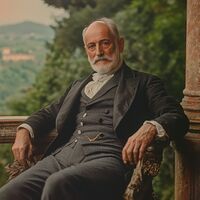Lino Edgardo Barsotti-Vaccaro
| Personal details | |
|---|---|

| |
| Honorific prefix | Dr. |
| Birth name | Lino Edgardo Barsotti |
| Birth date | 02-04-7507 |
| Birth place | Crepandola, Duchy of Viceno, Anisora, Anisoran Empire |
| Death date | 19-09-7570 |
| Death place | Mirrano, Principality of Torzarola, Anisora, Anisoran Empire |
| Nationality | Anisoran |
| Education | Peradotto University, Philosophy; University of Valamaggiore, Doctorate in Political Philosophy |
| Alma mater | University of Valamaggiore |
| Philosopher, Novelist, Philologist, Educational Reformer, Poet | |
| Years active | 7527–7570 |
| Era | 76th Century Philosophy |
| Employer | University of Valamaggiore |
| Known for | Contributions to Existentialism, Apathedeism, Educational Reforms |
| Notable works | The State and the Self: An Exploration of Obligation, The Apathetic God; The Apathetic Self, Principles of Educational Theory |
| Title | Professor of Political Philosophy |
| Spouse | Enrico Vaccaro-Barsotti |
| Children | Luigi Barsotti, Gabriele Barsotti |
| Footnotes | Barsotti-Vaccaro was a significant figure in educational reform and the founder of the religious ideology Apathedeism. |
Lino Edgardo Barsotti-Vaccaro (born Lino Edgardo Barsotti; adjectival form Barsottian; 2 April 7507 - 19 September 7570) was an Anisoran philosopher, novelist, philologist, educational reformer, and poet. Barsotti is best known for his contributions to the field of existentialism, his work on the pedagogical principles known as "Educative Universalism," and his various political treatises, which have had a profound impact on Anarian political thought. He was considered one of the leading minds of existentialism and was the founder of the religious ideology of Apathedeism.
During his career, Barsotti-Vaccaro published more than 30 books, along with hundreds of essays and public lectures. He wrote extensively on a wide range of subjects and significantly influenced political thought, the humanities, linguistics, sociolinguistics, political theory, historiography, cultural criticism, education, literary criticism, and art criticism. He also influenced religious thought in Anaria and was inspired by Mennity Orkanan, although he never converted due to his rejection of many core Orkanan principles. His most well-known contribution to religious thought was his philosophical concept of Apathedeism, which maintains that divinity does and always has existed but that it has no interest in humanity or the world and has never had any direct impact on Gotha. Consequently, his ideas have proved influential in many non-interventionist Orkanan faiths.
Barsotti dedicated his later life to formulating his pedagogical work and was well known for his activism for full educational equality. He spoke to the Senatus Imperiosus (Imperial Senate) many times during his later years. He was a colossal figure in education in Anisora for much of his career, and his ideas have been among the most influential on the education system of Anisora and elsewhere. His principal theory of "Educative Universalism," which argued for a universal education curriculum for all children irrespective of class, gender, and race, remains controversial in the socially stratified Anisoran Empire. In 7559, he founded the Anisoran Society for Universal Education (Societá Anisorana per l'Educazione Universale), which continues to petition the Anisoran government to implement Barsotti's ideas today.
Barsotti studied philosophy at Peradotto University before completing his doctorate in political philosophy at the University of Valamaggiore, where he remained a fellow of Capello College and eventually became a professor of political philosophy in 7535. He was a renowned and respected academic throughout Anaria, gave talks and held conferences across the continent, and received over ten honorary doctorates and fellowships at many renowned academic institutions across Gotha. There have been calls from within the Anisoran academe and the Peratolian Orkanan congregation of Pastana for him to be canonized as a Peratolian exemplar for his contributions to the advancement of knowledge and his educational activism.
In 7548, Barsotti married Carla Isabella Todaro, a fellow philosopher renowned in her field of anthropology and social theory. Together they had two sons, Luigi and Gabriele. In 7554, he divorced Isabella Todaro and married Enrico Vaccaro, a renowned educator and headmaster of Exemplar Mathars School in Panzolla. They met at an academic conference in Valamaggiore in 7552, became lovers, and married less than two years later, taking each other's names. Enrico significantly influenced Barsotti's educational theories and was acknowledged by Barsotti as a co-writer of his major work, "Principles of Educational Theory" (7562). Enrico supported his husband's crusade, which was a dual project, and has headed the Society for Universal Education since Barsotti's death.
Notable Works
All works cited below are given in their Hallish translation. Barsotti-Vaccaro primarily wrote in Pastanan and Anisoran, although he also wrote in Livaria.
- Writing Philosophy (7538)
- The Imaginary Nothingness (7540)
- The State and the Self: An Exploration of Obligation (7542)
- The Vast Halls: Meditations on Literature (7544)
- Historicising the Historical (7545)
- Beyond Laughing into the Void (7546)
- Post-Ronacallism in Eastern Philosophical Thought (7550)
- The Apathetic God; The Apathetic Self (7557)
- Principles of Educational Theory (7562) - co-authored by Enrico Vaccaro-Barsotti
- The Will to National Political Thought (7568)
Selected Essays
- On the Immortal Art (7539)
- Against Interventionalism in Orkanan Thought (7540)
- On Universal Morality and an In-Universal Moral (7548)
- In Defence of Universal Education (7557)